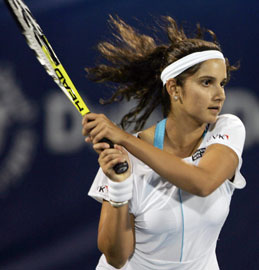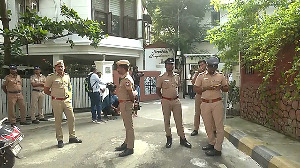Her personal form may have taken a dip since the wrist surgery, but Sania Mirza, sans her nose ring and graffiti T-shirts, will still be one of the star athletes when the Indian Olympic contingent travels to Beijing.
"I am obviously very excited, because it's the Olympics and every athlete dreams of representing their country," Sania told rediff.com ahead of her first appearance at the mega-event.
"As soon as you go to the Asian Games or Olympics you are not only playing for yourself or your family; you have the whole country behind you. We are individuals, so to say, but at the Olympics you feel more responsible for your country; that's the pressure and privilege everyone enjoys, and wants to have behind their back."
Ever since her blockbuster entry at the 2005 Australian Open, Sania has become the most (almost obsessively) followed player, outside of cricket. Every win, every loss, every move is scrutinized, criticised at times, praised to heights at others. Excessive, is the only reaction to everything Sania.
"I used to take a lot of pressure, not any more," the Hyderabadi girl says of shouldering national duty at the Olympics.
"When you come from India you learn to deal with things like that because a lot of people are very emotional about their heroes. So you learn to cope with the pressure and enjoy it.
"And I always say that the minute I stop enjoying it, I think I'll quit."
Sania has a decent record while representing India at major events. She won four gold medals (women's singles, mixed doubles, women's doubles and women's team event) on her India debut at the 2003 Afro-Asian Games at the age of 16.
At the 2006 Asian Games she won a silver in the singles and team event, and clinched the gold along with Leander Paes in the mixed doubles. But Sania admits that the Olympics will be a different challenge altogether.
"It is at a much bigger level and has higher stakes," she says. "I am still recovering from my injury, but am just excited to be healthy and competing again and I am just going to take it match by match.
"Obviously, winning a medal is the goal for everyone out there, and even if not, I am going to give everything I have to win that medal!"
 Sania and US-based Indian Sunitha Rao have also been granted a wild card for the women's doubles at the Beijing Games. Though teammates in the Fed Cup, the duo has rarely combined at WTA events.
Sania and US-based Indian Sunitha Rao have also been granted a wild card for the women's doubles at the Beijing Games. Though teammates in the Fed Cup, the duo has rarely combined at WTA events.
"We are the underdogs," says Sania. "It is very good for her as well (getting the Olympic entry). She plays for us, she plays for India now. But we have never really played together besides it and it's going to take a lot for us to win the medal there."
The 21-year-old hasn't had the best of preparations for the Games. Coming back from a wrist surgery mid-way into the year, she struggled in her favourite part of the season, at the US hard-courts. She made a first-round exit at Stanford and could only improve to second round at the LA Classic. She will play in Stockholm this week before heading to the Olympics.
But considering that she's undergone a wrist surgery, Sania is just happy to be there.
"I think it's different when you come back from injury and different when you come back from surgery.
"It's been three-and-a-half months after surgery and I'm already competing, feeling healthy. I know people who have not come back for eight months after their surgery. Rest is such an important part, especially for a player like me, where I feel that my whole game depends on my wrist. So this (going under the knife) was a very big decision for me to take."
While once criticised for her lack of fitness on court, Sania has improved a great deal in the past few years. But the effects of the tough regimen may be showing in form of injuries, especially when she looks poised for a consistent run.
Overtraining has been one of the major causes for sports injuries around the world, but Sania says there is no other way around.
"The fact is that if we don't do too much training then we can't get where we are. So you have to put your body through that every day. It's like we are almost defying nature everyday.
"I think it's like a routine for us to get injured or go get a surgery and come back and compete.
"Yes, there is a lot of tennis happening; I can see that for myself, but that's how it is. That's how competitive it is and I think today [women's] tennis is at its healthiest best. We don't actually have a number one and it keeps fluctuating every week and its great how much depth there is; so we have to kind of go through that grind all the time."
A case for the depth in the women's game was made at this year's Wimbledon where the top four seeds failed to make it to the quarter-finals. And at the top of the giant-slayers' list were two Asians- China's Jie Zheng and Tamarine Tanasugarn of Thailand.
As one of the top Asian players, Sania is pleased to be a part of the changing landscape of tennis.
"I remember when I used to come out on tour as a junior, people didn't think there were women's tennis players from India. That whole thing has changed today. We are here and we are representing out countries in the Olympics.
"As I said, women's tennis is at its best, with everyone fluctuating and everyone from No.1 losing to anyone in the top-200. That's something that has happened. Wimbledon was the perfect example of how deep women's tennis is gone. You just have to keep working hard. As an Asian, I feel very proud to represent not just my country but my continent."
An Olympics debut in China will surely make it even more special for the Indian ace.






